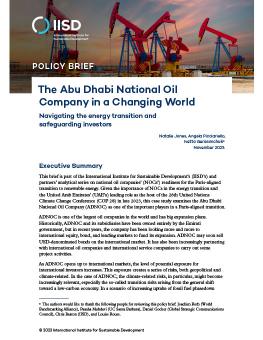
The Abu Dhabi National Oil Company in a Changing World: Navigating the energy transition and safeguarding investors
This case study examines the Abu Dhabi National Oil Company (ADNOC) as one of the important players in a Paris-aligned transition. As ADNOC opens up to international markets, the level of potential exposure for international investors increases. At the same time, this creates opportunities for investors to engage with ADNOC in its decarbonization.
This brief is part of IISD’s and partners’ analytical series on national oil companies’ (NOCs’) readiness for the Paris-aligned transition to renewable energy. Given the importance of NOCs in the energy transition and the United Arab Emirates’ (UAE’s) leading role as the host of the 28th United Nations Climate Change Conference (COP 28) in late 2023, this case study examines the Abu Dhabi National Oil Company (ADNOC) as one of the important players in a Paris-aligned transition. ADNOC is one of the largest oil companies in the world and has big expansion plans.
Historically, ADNOC and its subsidiaries have been owned entirely by the Emirati government, but in recent years, the company has been looking more and more to international equity, bond, and lending markets to fund its expansion. ADNOC may soon sell USD-denominated bonds on the international market. It has also been increasingly partnering with international oil companies and international service companies to carry out some project activities.
As ADNOC opens up to international markets, the level of potential exposure for international investors increases. This exposure creates a series of risks, both geopolitical and climate-related. In the case of ADNOC, the climate-related risks, in particular, might become increasingly relevant, especially the so-called transition risks arising from the general shift toward a low-carbon economy. In a scenario of increasing uptake of fossil fuel phasedown commitments by other countries, it would be in the UAE’s self-interest to begin a managed energy transition as early as possible, in order to have the time to diversify its own economy effectively, protecting its people and businesses from the risks of political inaction.
NOCs account for half of the world’s oil and gas production, control two thirds of global oil and gas reserves, and often play a key role in the economic development of their own countries. In order to limit global warming to 1.5°C above pre-industrial levels, there is no room for new oil and gas expansion, and existing production must decline by at least 65% by 2050. As such, if the world is to stay within the 1.5°C limit, NOCs must begin decarbonizing their activities, and investors have a key role to play in directing and incentivizing them to do so.
This case study pays specific attention to direct and indirect investment in ADNOC and the exposure of international investors. While the UAE government is the main owner and investor in ADNOC, many international investors hold equity stakes of up to 40% in various ADNOC subsidiaries. In addition, this case study examines the role of the world’s biggest commercial banks, as well as partnerships between ADNOC, international oil companies, and international service companies, as well as ADNOC’s ownership of assets under foreign jurisdictions.
While this case study shows how the UAE government and foreign investors are exposed to ADNOC risks, it also suggests steps forward in how the UAE government and international investors can mitigate their risk by engaging ADNOC in decarbonizing.
You might also be interested in
December 2024 | Carbon Minefields Oil and Gas Exploration Monitor
In November 2024, 23 oil and gas exploration licences were awarded across five countries, with Russia granting the licences that account for the largest portion of embodied emissions.
Increased Support Needed to Achieve India's Clean Energy Goals
India is on track to achieve many of its 2030 clean energy goals but needs to step up government support measures to accelerate the deployment of offshore wind, electric vehicles, and green hydrogen, according to a new report.
Budgeting for Net Zero
This study estimates the cost gap for battery energy storage systems (BESSs), offshore wind, solar photovoltaic (PV), electric vehicles (EVs), and green hydrogen (GH2) to inform government support.
Ending Export Credits for Oil and Gas: How OECD countries can end 2024 with a climate win
For a year now, Organisation of Petroleum Exporting Countries (OECD) governments have been negotiating an agreement that could put an end to oil and gas export finance. Following the acrimony in Baku, this would be a very real way for the OECD to show policy coherence, respond to calls from the poorest countries to stop subsidizing fossil fuels, and shift public finance to solutions.